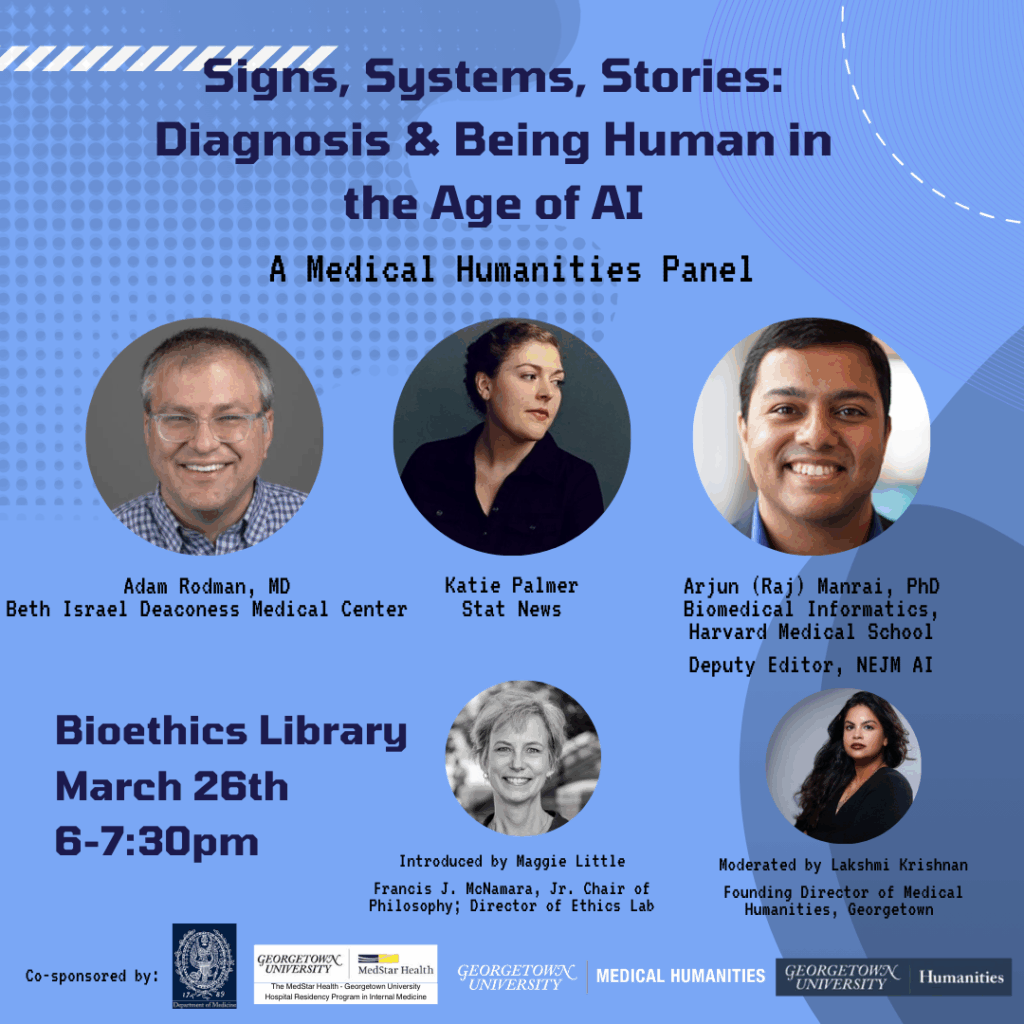“What Makes Us Human in the Age of AI?” Series
Georgetown Humanities, in collaboration with the Center for Digital Ethics, launched the interdisciplinary event series “What Makes Us Human in the Age of AI?” The purpose of this ongoing initiative is to foster exchanges across departments on the role of intrinsically human attributes and of the humanities in facing the challenges of the latest digital and technological revolution.
On March 26, 2025, the Medical Humanities Initiative contributed to the series with the panel “Signs, Systems, Stories: Diagnosis & Being Human in the Age of AI,” organized and moderated by Prof. Lakshmi Krishnan (Founding Director of Georgetown Medical Humanities; Co-Executive Director of the Georgetown-Howard Center for Medical Humanities & Health Justice).

Panelists included Adam Rodman, Katie Palmer, and Arjun (Raj) Manrai.
Adam Rodman, MD, at Beth Israel Deaconess Medical Center, is a passionate medical educator, internal medicine physician, and storyteller. He co-directs the Innovations in Media and Education Delivery (iMED) Initiative at BIDMC, is dedicated to studying and promoting digital education, and is a national leader in the field. He also hosts the medical podcast Bedside Rounds in partnership with the American College of Physicians. Katie Palmer is a health tech correspondent at STAT News, covering telehealth, clinical artificial intelligence, and the health data economy—with an emphasis on the impacts of digital health care for patients, providers, and businesses. She previously led health and science coverage as a senior editor at Wired and as an editor at Quartz. Arjun (Raj) Manrai is an Assistant Professor in the Department of Biomedical Informatics at Harvard Medical School, where he leads a research lab that works broadly on applying machine learning and statistical modeling to improve medical decision-making. Raj is also a founding Deputy Editor of NEJM AI, the new artificial intelligence-focused journal from the publishers of the New England Journal of Medicine, and co-host of the NEJM AI Grand Rounds podcast.
The panel tried to transcend both apocalyptic fears and utopian promises. The engaging discussions and the ensuing Q&A revolved around examples of AI in diagnosis or clinical reasoning, comparisons between AI integration and previous technological transitions (such as the stethoscope or electronic health records), the challenges of reporting on AI in medicine, changes to problem-solving in healthcare when different disciplines try to develop a common language around AI, the distinctly human elements of diagnostic expertise that survive AI, whether AI diagnostic tools amplify or help resolve health disparities, and how to proactively build ethical considerations into AI systems from the ground up, especially for diagnostic processes.
Prof. Maggie Little, founding co-chair of Tech and Society at Georgetown, Director of the Ethics Lab, and senior scholar at the Kennedy Institute of Ethics, provided opening remarks to frame the discussion, and Professor Nicoletta Pireddu, Inaugural Director of the Georgetown Humanities Initiative, offered closing remarks.